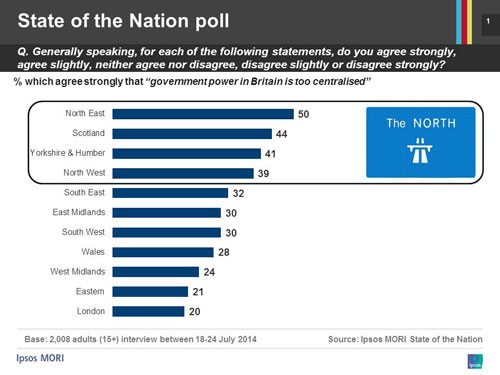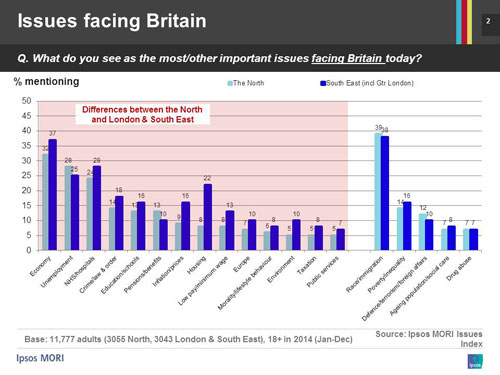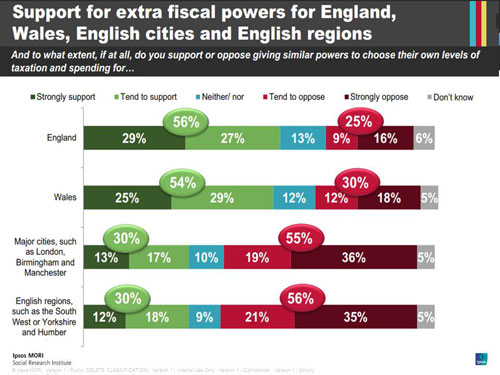Where does the public stand on devolution?
 2014 will be marked as the year in which the debate about devolution placed itself firmly on the political agenda. The Scottish Referendum was a catalytic event which broadened the discussion about transferring centrally held powers to the regions of England so they can become masters of their own economic destiny and govern in the local interest.
2014 will be marked as the year in which the debate about devolution placed itself firmly on the political agenda. The Scottish Referendum was a catalytic event which broadened the discussion about transferring centrally held powers to the regions of England so they can become masters of their own economic destiny and govern in the local interest.
The strength of feeling is reflected in our State of the Nation poll in 2014 which suggested northerners are more likely than southerners to strongly agree that government power in Britain is too centralised.

Moreover, trust in local councils has been steadily increasing since the turn of the century and now significantly more people trust their local council to make decisions about how services are provided in their local area (79%) than government (11%).
So what are the day-to-day priorities faced by northerners? Do they really differ that much from those living in London and the South East? Each month Ipsos runs an Issues Index, which asks a representative sample of Great Britain’s population what they think is the most important issue facing Britain today.
On the face of it, the Index shows that northerners are facing the same day-to-day concerns as those living in London and the South East. In the last quarter of 2014 a similar set of issues were ranked important in the North as in London and the South East, including race/immigration, the economy, unemployment and the NHS. However, dig a little deeper and there are certain issues which are seen very differently depending on whether you live in the North or London and the South East.

Most significantly was the issue of housing, which was considered one of the biggest issues facing Britain today by nearly a quarter of those residing in London and the South East (22%) whilst only 8% mentioned it in the North. Also, if there is indeed a cost of living crisis the data suggests that it is a bigger issue for those living in London and the South East than in the North. Significantly more people in the south identified inflation/prices (16% London & SE, 9% North) and low pay (13% London & SE, 8% North) as key issues facing Britain compared to those living in the North.
So does the public see devolved powers in England as a possible solution to dealing with these varied issues? Well as it stands the issue of devolution and constitutional reform is low on the priority list. For the first three quarters of 2013 no-one in the North identified devolution/constitutional reform as a priority in our Issues Index.

In fact, northerners actually mentioned 28 alternative issues which they considered to be more important for the country than devolution/constitutional reform - including animal welfare (2%) and nuclear war/disarmament (4%). Whilst greater exposure to the debate in 2014 did begin to give it traction in the minds of the public, the percentage of people seeing it as an important issue facing Britain has never reached 5%.
Of course, it is a bit unfair to expect people to spontaneously mention devolution when there will be much more pressing problems that come to mind. But, more significantly, when asked directly, a greater percentage of the population are opposed to devolving tax and spend powers to either the cities or regions of England than support it.

So devolution is low on the public priorities list at the moment – and when asked directly they seem sceptical. We know from previous work on regional assemblies that regional control is a difficult sell. For example, when asked about an elected regional assembly for the North East of England region, three-quarters of the public in that region either knew ‘nothing’ or ‘not very much’ about the proposals. Furthermore only 29% actually supported the North East having its own regional assembly.
So we need to avoid the mistakes of the past in assuming that disillusionment with Westminster and the differing perspectives on issues in the regions will automatically lead to popular support for devolution. But the context is very different – a more devolved future certainly seems more possible now, as long as more work is put into taking the public along for the ride.
- Matthew Bristow is a research manager in our Manchester office.



